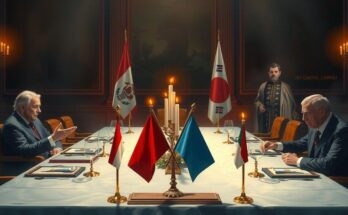Canada’s imminent election features Pierre Poilievre and Mark Carney, promising a pivotal battle over national identity and governance. Carney’s rise followed Chrystia Freeland’s resignation, which destabilized Trudeau’s leadership. The election will address concerns stemming from Trump’s ambitions, complicating Poilievre’s campaign. Voter sentiment is shifting as candidates present differing visions for Canada’s future amidst significant political pressures.
Canada is poised for its most significant election yet, featuring a pivotal face-off between Pierre Poilievre and Mark Carney. Carney’s ascent to the role of Liberal Party leader and anticipated prime minister follows a series of dramatic events, notably the resignation of Chrystia Freeland, which shattered the current Liberal leadership’s standing. Her departure forced Prime Minister Justin Trudeau to acknowledge his administration’s struggles, prompting an urgent need for leadership change to avert a potential Conservative takeover under Poilievre.
Freeland’s unexpected resignation incited widespread political upheaval, leading to Carney being swiftly supported by numerous colleagues. Despite her previous influence, Freeland’s results were dismal, as she managed only eight percent of initial votes. Nevertheless, her actions inadvertently steered the party towards a reassessment of its strategy to maintain governance in Canada without facing growing opposition.
Carney is expected to assume office shortly and is likely to initiate a national vote, with the central issue emerging as the threat of U.S. expansionism under Donald Trump. The election will serve as a referendum on the country’s sovereignty as Canadians grapple with Trump’s ambitions of annexation. While Poilievre initially held an advantage, the political landscape shifted substantially with Trump’s resurgence, culminating in an existential crisis for the Canadian political sphere.
Following Trump’s renewed focus on Canada, Poilievre’s campaign, which originally promised a clear distinction from the Liberal Party’s policies, found itself entangled in the Republican leader’s controversial rhetoric and strategies. As Poilievre positions the election as a choice between a beleaguered Liberal government and an ambitious, egalitarian vision for Canada, he faces fierce backlash targeting his alleged allegiance to Trump.
Carney has sharply criticized Poilievre’s alignment with Trump, highlighting that, “Pierre Poilievre’s plan will leave us divided and ready to be conquered.” Poilievre’s critics argue his populist tactics mirror Trump’s divisive and aggressive stance. This perception, characterized by ad campaigns referencing Poilievre’s past connections to Trumpian politics, threatens to overshadow his campaign message.
Public sentiment appears volatile, with recent polls indicating that a notable percentage of Conservative supporters are inclined toward unification with the U.S. This reality complicates Poilievre’s efforts to distance himself from Trump’s influence while navigating a counteroffensive from the Liberal Party, implicating Carney’s corporate decisions.
As the election approaches, the core question remains whether Carney or Poilievre can resonate with Canadians as the leader capable of steering the nation through uncertain times. While Poilievre is adept at conveying a direct message, Carney’s technocratic style may lack the charismatic appeal needed to engage voters. The impending election represents a critical juncture for Canada’s political future, revealing deep anxieties regarding national identity and global positioning.
In summary, Canada’s upcoming election between Pierre Poilievre and Mark Carney signifies a crucial moment in its political landscape. The contest is shaped by significant events, including Freeland’s resignation and the resurgence of Trump’s influence, which have altered the dynamics of the race. Voters must navigate complex narratives surrounding national identity and governance, as both candidates present contrasting visions for the country’s future. The outcome will determine the political direction of Canada amidst rising existential concerns.
Original Source: www.aljazeera.com




